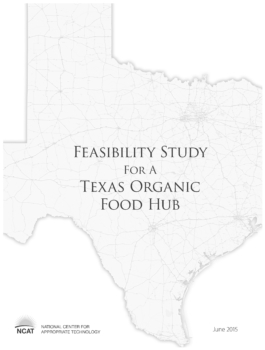Feasibility Study for a Texas Organic Food Hub
By Robert Maggiani and Mike Morris, NCAT Agriculture Specialists
Overview
In 2014-2015, NCAT studied the feasibility of a food hub that would aggregate fresh certified organic produce from small- to mid-sized Texas farms, making these products conveniently available at volumes large enough to be attractive to retailers.
The main purpose of this food hub would be to increase net incomes of small farms by creating access to the growing market for certified organic food while also addressing the underdeveloped state of organic farming in Texas: a missed economic opportunity that causes retailers to purchase the vast majority of organic produce from outside the state.
The project team surveyed all organic produce farms in Texas; interviewed growers, buyers, and other industry experts; offered trainings on organic certification and food safety; met with food hub managers and organizers from around the country; and investigated market conditions, business structure options, infrastructure needs, crop availability, transportation, insurance, food safety, and other topics.
The report shows how a Texas organic food hub could perform and be profitable under realistic assumptions, while the companion Food Hub Planning Workbook (spreadsheets and User’s Manual) enable food hub planners and managers to model or forecast the financial performance of a hypothetical or existing food hub, generating income statements and cash flow statements.
Funding for these publications was provided by the Rural Business Enterprise Grant program of USDA Rural Development, award number 49-015-752017047.
This publication is not available in digital format. Please download a copy using the download button at right.
Companion documents:
Template (Excel spreadsheet)
Texas Food Hub Year 1 (Excel spreadsheet)
Texas Food Hub Year 2 (Excel spreadsheet)
Texas Food Hub Year 3 (Excel spreadsheet)
Food Hub Planning Workbook User’s Manual

